QuestionQUESTION: Hello Sir, I hope everything will be fine overthere.
Sir i have an ALEXANDRINE PARAKEET (male). i purchaised it when it was only of 20 days, Now he is of 2 years. I give him seeds, corn n a wide variety of fruits. The behaviour of my Alexandrine parakeet is v v good, it never bites anyone. But the problem i faced is that this is breeding season in PAKISTAN n my parrot is having serious behaviour problem, it screams n screams all the day, he pushes his wings back and forward most of the time, he is taking full diet n having planty of fresh water, some one told me that bcoz it is breeding season n the harmoons of the bird are active. Sir i want to ask that as it is the only bird in my house n he feels fear from other birds. if i arrange a female for him, can he breed??? people say that pet parrots don't know how to breed as they have never seen their mate. Female parrot can solve the problem of his screeming behaviour??? Thanx for giving ur precious time
ANSWER: Hello Shani,
Do you have access to any parrot pellets (food) in Pakistan? Roudybush, Harrisons or Zupreem parrot pellets are all excellent pellets for your bird. I ask because an all seed diet is very unhealthy for your bird. Seeds are high in fat and lack the nutritional value needed for a well balanced diet. If you can, get a hold of some pellets and slowly convert your bird to a part pellet partial seed diet. You don't have to stop giving him seeds, just reduce them slowly over time until he has about 75% pellets and 25% seeds in his bowl at feeding time. You can also offer your bird fresh vegetables. Carrots, kale, broccoli, cooked sweet potato (dark green and orange) are all great sources of nutrients. If he doesn't seem to like them at first, keep offerring them regularly... they eat what they are visually familiar with - so it may take some time for him to recognize anything new as food.
Are you 100% certain your bird is a male? Does he have the black ring around his neck? Either way - I would not recommend getting him a mate to cure his hormonal problems. Unless you are fully prepared to deal with them breeding, having babies and all the potential problems that could come along with that (egg production and laying are very taxing on a female and sometimes they experience egg peritonitis or egg binding which will lead to a painful death). Also, sometimes the paronts will reject the babies and you may have to resort to handfeeding the babies, which is a difficult process. If done incorrectly, they can aspirate (choke) and die.
If you want to get another bird to keep him company (I have nine parrots!), that's another option, but I definitely would not let them breed at all. There are just too many homeless birds out there in the world who are suffering. Is there a bird rescue or adoption center near you? Perhaps you could start there and try to find a companion bird for your parrot. If you do bring another bird in your home, you should quarantine the new bird away from your current bird for a minimum of 30 days to assure the bird is healthy. Be prepared to keep them in separate cages - but allow them playtime together under your supervision.
There are other ways you can help your bird during this time. I have a male Amazon parrot who exhibits some serious hormonal behavior during the spring. You don't want to encourage any of this behavior by providing any nesting materials (paper or anything he can shred) nor petting him if he shows signs of matting behavior. Be sure your bird is getting at least 10 - 12 hours of dark interrupted sleep every night. Sleep is a crucial part of a physically and emotionally healthy bird. Daylight can effect their hormones as well - so don't be afraid to put your bird to bed before it gets completely dark. In the wild, parrots return from their foraging excursions right around the time the sun lowers in the sky and will spend sunset vocalizing with their flock to account for everyone after splitting up all day. You can put your bird to bed around 7pm and allow him to sleep through the night until 8 or 9am the next morning.
Does your bird have toys in his cage to keep him occupied? Toys are a vital part of a captive bird's life... they are very intelligent and need things to do to stimilate their mind. of course, be sure that these toys are specifically made for birds as there are MANY materials out there that are toxic and harmful for birds. Also be sure your bird gets plenty of out of cage time every day. If your bird can fly - be sure your home is safe and he cannot escape. Spend 1 - 2 times directly interacting with your bird in play, talking or just time spent together. Parrots are flock animals, very social creature who by instinct are used to living in groups. To him, you are his flock, his family - and he needs plenty of time with you every single day to stay sane.
As far as the screaming... I know it's hard to listen to, but do everything you can NOT to react to it at all. If you say anything or go over to the bird - you are encouraging him to scream by giving him attention. Wait until the moment he stops screaming and then immediately go to him and tell him what a good bird he is. Give him a treat and verbally praise him for being quiet. You may have to continue doing this for a long time, but just be patient and if you keep it up, it will hopefully pay off.
Are there any avian (bird) veterinarians near you where you live? I would also recommend taking him to an animal doctor that has experience with parrots for a full exam, blood test and fecal test. It's always a good idea to make sure there are no medical reasons for his behavior first - then you can start to work on the behavior.
I hope this helps you and wish you and your bird the very best.
---------- FOLLOW-UP ----------
QUESTION: Hi again,
Thank u sir, ur answer was v informative n nearly had solved my problem
but i want to take some more time of urs.
First of all u talked about PELLETS, sir in Pakistan only imported
pellets are available n bcoz they are imported, they r v costly, the
price of a 2kg pack of pellet is equal to the price of an ALEXANDRINE
PARAKEET, so i cant afford it at all, but i give my parrot a variety of
fruits every day, from now on i will also offer him vegitables as u
suggested.
Yes it is a confirm male, with black n red ring around his neck. Sir i
m fully prepared to deal with them breeding, i have no experience in
breeding but have much experience in feeding babies of Alexandrine
Parakeet as it is a common bird in pakistan n i have already hand fed
many babies (1 baby was only of 3 days n now he is of 1 year, my sister
took him with her). so it is not a problem to feed babies as i LOVEEE
to feed them. But i dont have experience in breeding these parrots.
I have 3 little questions;
1. My Alexandrine is wing clipped, is it difficult for wing clipped
parrots to breed as they cannot balance themselves???
2. What will u suggest for my Alexandrine, a tame female or a wild
female???
3. it is the most important question, sry for long question :-( .
3months ago a 4 years old guest came to our house n he start teasing my
Alexandrine (my parrot feels v much fear from childrens), after
touching n teasing him, my parrot went into TRAUMA (unconsious), he was so
frightened that he closed his eyes, his feets turned inside n he fell
down. I understood the situation n call my mother (my alexandrine is v
v close to my mother n loves her v much), my mother patted him, kissed
him, n after 4 or 5 minutes it started to regain consious. It was
horrible to see him in such condition, my question is that what i have
to do if in future (may it never happens again) same problem occurs???
what will b the first step to be taken??? My Vet is 40 miles away from
my house so in emergency i have to do all stuff myself.
I hope u will answer my questions, n sorry for writing so long, GOD
BLESS YOU
AnswerHello again Shani, please call me Jenn, no need to be so formal (and I am a female :-).
I understand about pellets. So giving him extra veggies, fruits and fresh foods (no avacado, rhubarb, chocolate or caffeine) is a great idea!
Remember too, even if you put a male and female together - it doesn't guarantee that they will breed... which is fine, as long as they get along with each other. You're goal in getting another bird should be primarily to curve your little boy's loneliness. In order for them to breed - certain conditions will need to be met for both birds. So if you would rather them not breed - just do not provide a nestbox for them. If you do, be sure to research everything about breeding as they need nesting materials (shredded white paper, or white paper towels) in the nestbox to assure the eggs do not crack and the babies don't end up with splayed legs from being on a slippery surface.
Also remember that there is no guarantee that if you bring a female into your home that the two of them will even get along. Chances are better since they'll be the same species - but they may need some time of supervised playtime together to get to know one another. No matter where you get the second bird - be sure you QUARANTINE that bird separately, in a separate room for at least 30 days to assure she is healthy. This will also give them the opportunity to "talk" to each other from afar. Once 30 days is over and if all is well with her... bring her separate cage out to the room where your male is and keep them in separate cages for a while until it's evident that they will get along.
As to your questions - here are my honest answers:
1. Wing Clipping/Breeding: Wing clipping has little or no affect on their ability to breed at all. They can still flap their wings the same to balance themselves. Wing clipping was likely done as a safety measure to assure your bird doesn't escape or fly into walls/windows and injure himself - which is fine. As long as he still has the ability to float safely to the ground when flying - wing clipping will not be an issue when it comes to the act of mating.
2. Wild or tame: living in the USA - things are much different in regard to wild parrots. We only have one native species of parrot still alive - the slender billed parrot and they are only in a small portion of the country. And it is now illegal for anyone to both bring a wild parrot into the country AND to pluck a wild parrot out of their natural habitat to keep as a pet. Personally, I am strongly against taking ANY wild animal out of his natural habitat for any reason and caging it. There are far too many tame parrots needing homes for anyone to resort to doing so. Besides that - you never know what you're getting there... illness and behavior wise. I understand things are different and Pakistan and while I respect that fact, I beg you not to get or bring a wild bird into your home. Let the wild one's stay where they belong. :-) Find a tame one, around the same age as your male that you can bring home. :-)
Another part of this is that keep in mind... if the birds bond and become a pair together and breed, they may end up being more bonded wtih each other, over you. You will have to work extra hard with both of them, spending time with both of them together and individually to maintain your relationship and handling of them. :-)
3. Trauma: WOW Shani - that is scary scary!! It sounds like your bird may have fainted/passed out due to severe stress. If the heart of a bird pumps to quickly 1 of two things will happen; blood does not flow properly into the heart and out to the brain (carrying oxygen) so the bird will either faint from sheer terror or have a heart attack and pass away. I've seen both happen and you should consider yourself very lucky you did not lose your little guy. Stress also lowers the immune system and the body's ability to fight off illness and infection. So the best thing you can do for your bird is to never let that or any other child go near him again. If you have a child and this is unavoidable - it's time to educate the child on how to (and how not to) properly interact with your bird. Just the site of a small person can really horrify your bird based on that one experience alone. Poor fellow. If you have children that visit your home only periodically, it would be best to move your bird into another room for the duration of the visit, being sure that you periodically go in and reassure your baby that all is well. Once the child leaves, you can move the bird back into his usual area. Whatever you do, never leave your bird unattendted in the presence of a child. It's probable that this one experience traumatized your bird for life.
Again, I hope this information helps you and I am happy that you are doing research and asking questions. That's a good thing not many people do!
Good luck to you!

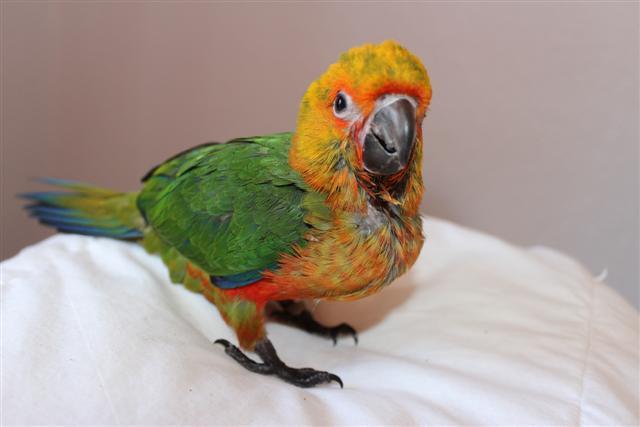 Jenday Conure Weaning?
Question
Castor the Conure
Hi
I have a 9 week o
Jenday Conure Weaning?
Question
Castor the Conure
Hi
I have a 9 week o
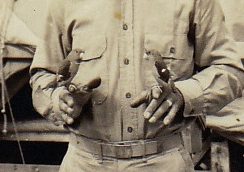 ID Birds
Question
Panama Birds
My uncle served in Panama in 1941
ID Birds
Question
Panama Birds
My uncle served in Panama in 1941
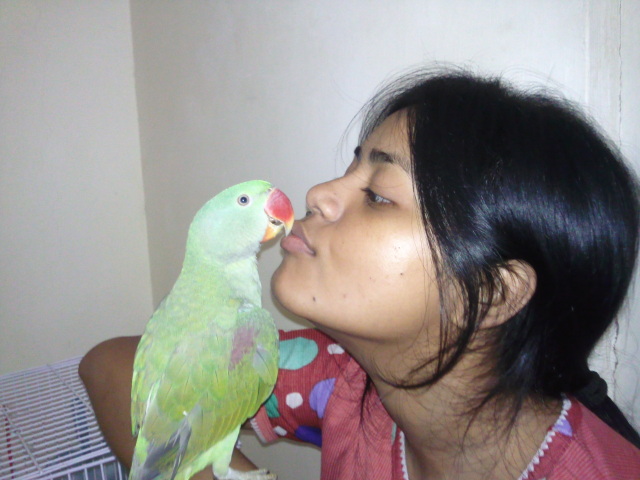 can i give my parrot chole(chana) called in hindi
Question
my little chaddi alexa
dear sir,
can give chan
can i give my parrot chole(chana) called in hindi
Question
my little chaddi alexa
dear sir,
can give chan
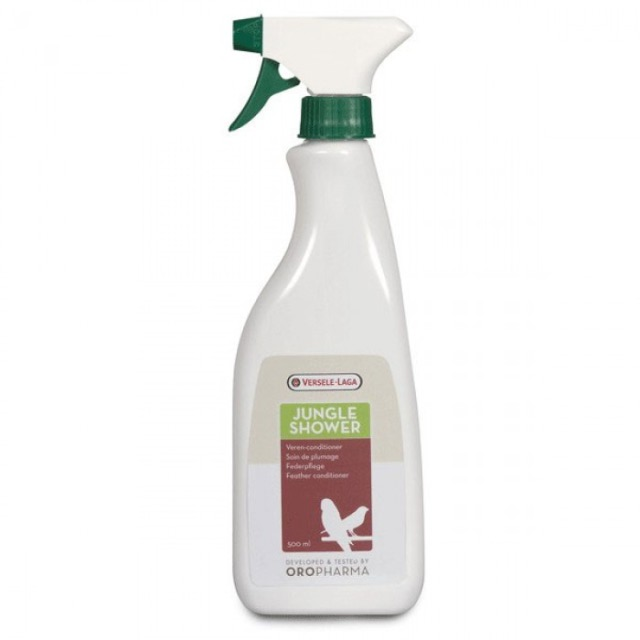 Indian Ringneck Health Issue
QuestionI have an Indian Ringneck who had been neglecte
Indian Ringneck Health Issue
QuestionI have an Indian Ringneck who had been neglecte
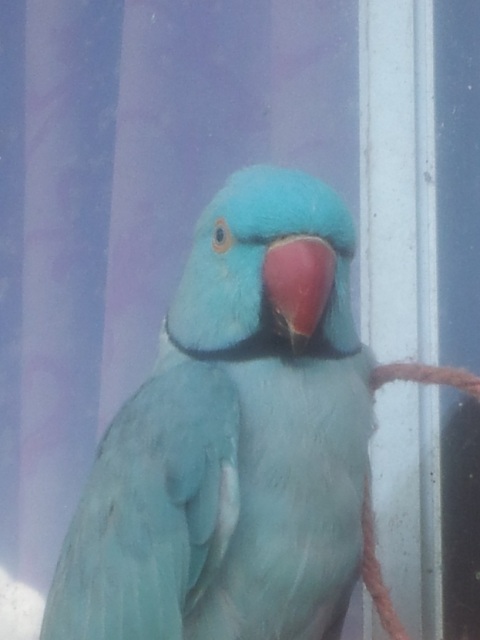 RE: Indian Ringneck probems
Question
Indy our Ringneck
Thank you for your he
RE: Indian Ringneck probems
Question
Indy our Ringneck
Thank you for your he